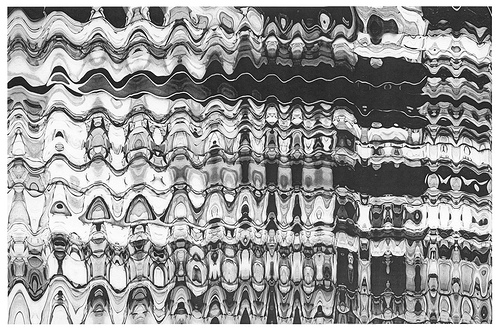Photo Credit: Steppinlotus
[This post was initially written on January 10, 2008 when this blog was housed on Computer Writing and Research Lab servers. While I have not migrated all content from that previous site to this one, I did want to provide a version of this post as it explains the name of this site.]
As you may have noticed, I’ve renamed my blog. [Edit: The blog’s previous name was “Confessions of a Graduate Student.”] I wanted a name that said a bit more about my interests and that was…well…a little bit more interesting. Below, I offer what others have said about the term “clinamen” (pronounced almost like “cinnamon.”) As you will see, it has to do with the impossibility that an atom (or any entity) is completely isolated. For me, this is what rhetoric is about. Everything and everyone is connected or “inclined” to one another. There is no “being by oneself.” Such a thing is impossible. It’s rhetoric’s job to negotiate the ways we “swerve” into one another.
And so, it all begins with Lucretius in the first century BC. Lucretius essentially invented the concept. Here’s a quote from his Of The Nature of Things:
“The atoms, as their own weight bears them down plumb through the void, at scarce determined times, in scarce determined places, from their course decline a little- call it, so to speak, mere changed trend. For were it not their wont thuswise to swerve, down would they fall, each one, like drops of rain, through the unbottomed void; and then collisions ne’er could be nor blows among the primal elements; and thus nature would never have created aught.”
However, the real reason for using this name for the blog is this quote from Jean-Luc Nancy’s The Inoperative Community:
“Still,one cannot make a world with simple atoms. There has to be a clinamen. There has to be an inclination or an inclining from one toward the other, of one by the other, or from one to the other. Community is at least the clinamen of the ‘individual.’ Yet, there is no theory, ethics, politics, or metaphysics of the individual that is capable of envisaging this clinamen, this declination or decline of the individual within community. Neither ‘Personalism’ nor Sartre ever managed to do anything more than coat the most classical individual-subject with a moral or sociological paste: they never inclined it, outside itself, over that edge that opens up its being-in-common” (3-4).
This is the definition of clinamen according to the Oxford English Dictionary:
Clinamen
An inclination, bias.
1704 SWIFT T. Tub ix. 106 The round and the square would, by certain clinamina, unite. 1823 DE QUINCEY Let. Young Man, Wks. XIII. 85 An insensible clinamen (to borrow a Lucretian word) prepares the way for it. 1827 HARE Guesses (1859) 226 No old word; which, with a slight clinamen given to its meaning, will answer the purpose.
According to Gilles Deleuze, in Difference and Repetition:
“Ancient atomism not only multiplied Parmenidean being, it also conceived of Ideas as multiplicities of atoms, atoms being the objective elements of thought. Thereafter it is indeed essential that atoms be related to other atoms at the heart of structures which are actualised in sensible composites. In this regard, the clinamen is by no means a change of direction in the movement of an atom, much less an indetermination testifying to the existence of a physical freedom. It is the original determination of the direction of movement, the syntheses of movement and its direction which relates one atom to another…If it is true that atoms, the elements of thought, move ‘as rapidly as thought itself’, as Epicurus says in his letter to Herodotus, then the clinamen is the reciprocal determination which is produced ‘in a time smaller than the minimum continuous time thinkable’. It is not surprising that Epicurus makes user here of the vocabulary of exhaustion: there is something analogous in the clinamen to a relation between the differentials of atoms in movement. There is a declination here which also forms the language of thought; there is something here in thought which testifies to a limit of thought, but on the basis of which it thinks: faster than thought, ‘in time smaller…’. Nevertheless, the Epicurean atom still retains too much independence, a shape and an actuality. Reciprocal determination here still has too much of the aspect of a spatio-temporal relation. The question whether modern atomism, by contrast, fulfills all the conditions of a structure mst be posed in relation to the differential equations which determine the laws of nature, in relation to the types of ‘multiple and non-localisable connections’ established between particles, and in relation to the character of the ‘potentiality’ expressly attributed to these particles” (184).

2 Comments
Fatal error: Uncaught Error: Call to undefined function ereg() in /home/clinam5/public_html/clinamen/wp-content/themes/autofocus/functions.php:734 Stack trace: #0 /home/clinam5/public_html/clinamen/wp-content/themes/autofocus/functions.php(692): commenter_link() #1 /home/clinam5/public_html/clinamen/wp-includes/class-walker-comment.php(174): custom_comments(Object(WP_Comment), Array, 1) #2 /home/clinam5/public_html/clinamen/wp-includes/class-wp-walker.php(145): Walker_Comment->start_el('', Object(WP_Comment), 1, Array) #3 /home/clinam5/public_html/clinamen/wp-includes/class-walker-comment.php(135): Walker->display_element(Object(WP_Comment), Array, 1, 0, Array, '') #4 /home/clinam5/public_html/clinamen/wp-includes/class-wp-walker.php(321): Walker_Comment->display_element(Object(WP_Comment), Array, 1, 0, Array, '') #5 /home/clinam5/public_html/clinamen/wp-includes/comment-template.php(2102): Walker->paged_walk(Array, -1, 0, 0, Array) #6 /home/clinam5/public_html/clinamen/wp-content/themes/autofocus/comments.php(43): wp_lis in /home/clinam5/public_html/clinamen/wp-content/themes/autofocus/functions.php on line 734